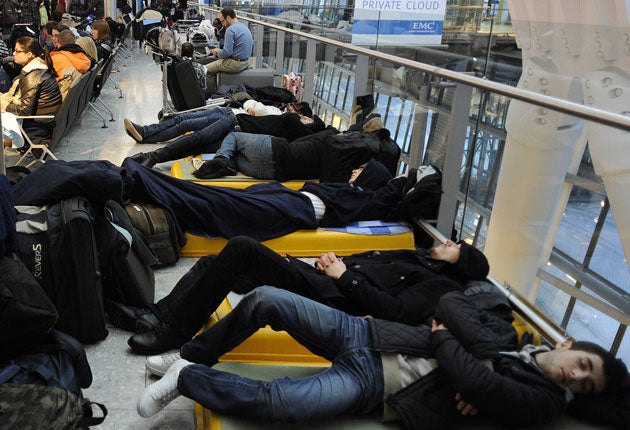Heathrow nightmare just gets worse and worse

Another 100,000 passengers contemplated Christmases ruined and holidays wrecked by the partial closure of Heathrow, as snow and ice kept its second, southerly runway closed until 5.30pm yesterday. It brings the number of travellers to and from the airport with journeys disrupted by the airport's inability to deal with extreme weather to 600,000. Many of those camped out at the hub of world aviation will be obliged to spend Christmas in the unholy transience of an airport terminal.
By 7am yesterday, as Heathrow struggled to cope with the sheer number of people stranded, around 1,000 hopeful passengers were queuing simply for admission to Terminal 3, the key long-haul terminal at Heathrow. Two women with toddlers in pushchairs were turned away for reasons, according to one official, of "health and safety", with security staff checking tickets against lists of confirmed departures, and enforcing a strict ban on anyone departing later.
The women were directed to one of the hastily erected marquees outside the terminal where the temperature was slightly above freezing. The only brightness conferred upon those denied access took the form of a Salvation Army van, dispensing tea, coffee and sympathy to travellers whose journeys had changed character from aspiration to desperation.
For some, the journey to Heathrow had been a battle in itself. Amy Whelan, a student from Co Waterford, Ireland, had abandoned hope of the short hop from Cork operating as planned, instead travelling by ship and bus to the airport in the hope of finally flying to New Zealand.
The five members of the Bianchessi family enjoyed two nights in Glasgow at BA's expense, en route from Los Angeles to Heathrow – from where they hope to board a flight to Stockholm tomorrow. "It's the worst experience in my life," said Franco Bianchessi. "I have never experienced such poor customer service. The only way I got through is because I figured out that because I speak Swedish I could call the British Airways offices in Sweden. You are on hold for about 30 minutes but at least you get to talk to a live person."
The partial opening of the airport meant that some of the aircraft dotted around European airports could finally return – loaded with passengers telling tales of extraordinary journeys.
Cologne in the second half of December is a city of many delights: the Roman foundations, gothic cathedral and formidable museums are augmented by half-a-dozen Christmas markets. But Barry Lloyd from Northern Ireland, who has just spent four days in the Rhine city, did not enjoy his stay that ended yesterday. He was obliged to wear the same blazer and open-neck shirt as he had worn on Friday when he boarded an Eva Air flight from Taipei to London. Just over an hour from landing, the Boeing 747 was diverted because of the snow in south-east England. "Eva Air has no representation at German airports, so the luggage stayed on the plane," he said. What was expected to be an overnight stop turned out to last for three extra days.
However the mismatch between the EU rules on customer care and what airlines are actually providing means that many passengers are running out of cash.
Syed Muhammad Islam, a student at the University of Leeds hoping to fly on Oman Air to India, is camped outside the airport chapel. He said he could not afford to continue to eat at airport prices. "They haven't given us any indication. They say 'maybe today; maybe tomorrow'. They are not sure about anything, they're just giving us 'maybe' answers, like 10 per cent, 20 per cent. They have given no confirmation."
As water dripped through a hole in the roof beside his makeshift camp, he said Indian airports would have made a much better job of the closure. "They would be shifting us to some accommodation at least so we don't have to sleep on the floor. They would definitely have made us go to a hotel or somewhere. It might be cheap, but at least they would have done that for us."
As the world's leading aviation hub degenerated to something akin to a prison, airlines' anger at their mounting losses intensified, at least in private. One senior executive railed against the "astonishing failures in communication" by BAA, the airport's Spanish owner.
While British Airways continued to reject any criticism of the airport operators, its losses rose faster than any of its rivals – due to the scale of its operation, and therefore the number of cancellations. Just one of the flights cancelled yesterday, from London to Los Angeles, represented £1m in ticket sales to BA – money it will never recover.
Join our commenting forum
Join thought-provoking conversations, follow other Independent readers and see their replies
Comments
Bookmark popover
Removed from bookmarks